
सूत्रधार एक प्रयास है हमारे जन सामान्य को कथाओं के माध्यम से हमारी महान संस्कृति से अवगत कराने का।
How to get URL link on X (Twitter) App

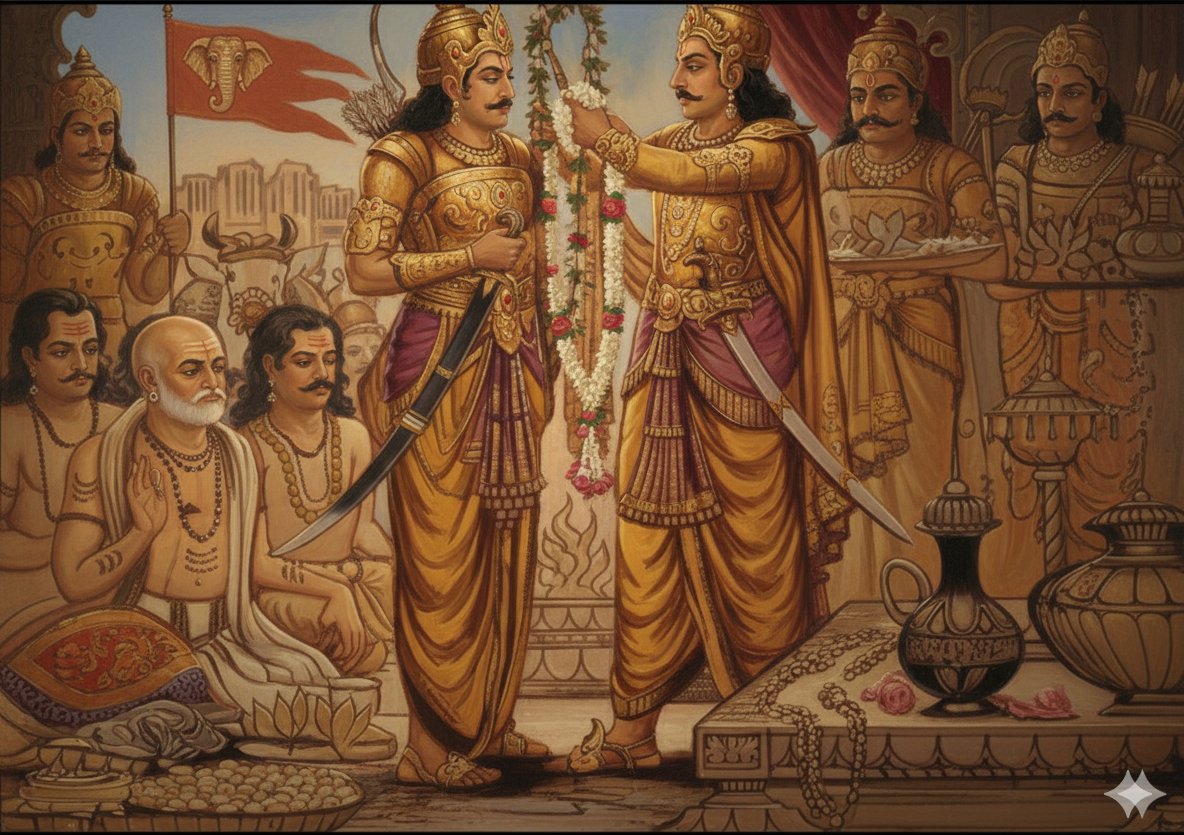
 Before dawn, the Kaurava army was joyfully and loudly assembled. Karna appeared in radiant splendour, blowing his conch, inspiring the troops, and making them forget the loss of Bhishma and Drona. He arrayed the Kauravas in the makara (crocodile) formation, placing himself at its head, with Duryodhana, Shakuni, Ashvatthama, Shalya, Kritavarma, and other chiefs assigned to key positions.
Before dawn, the Kaurava army was joyfully and loudly assembled. Karna appeared in radiant splendour, blowing his conch, inspiring the troops, and making them forget the loss of Bhishma and Drona. He arrayed the Kauravas in the makara (crocodile) formation, placing himself at its head, with Duryodhana, Shakuni, Ashvatthama, Shalya, Kritavarma, and other chiefs assigned to key positions.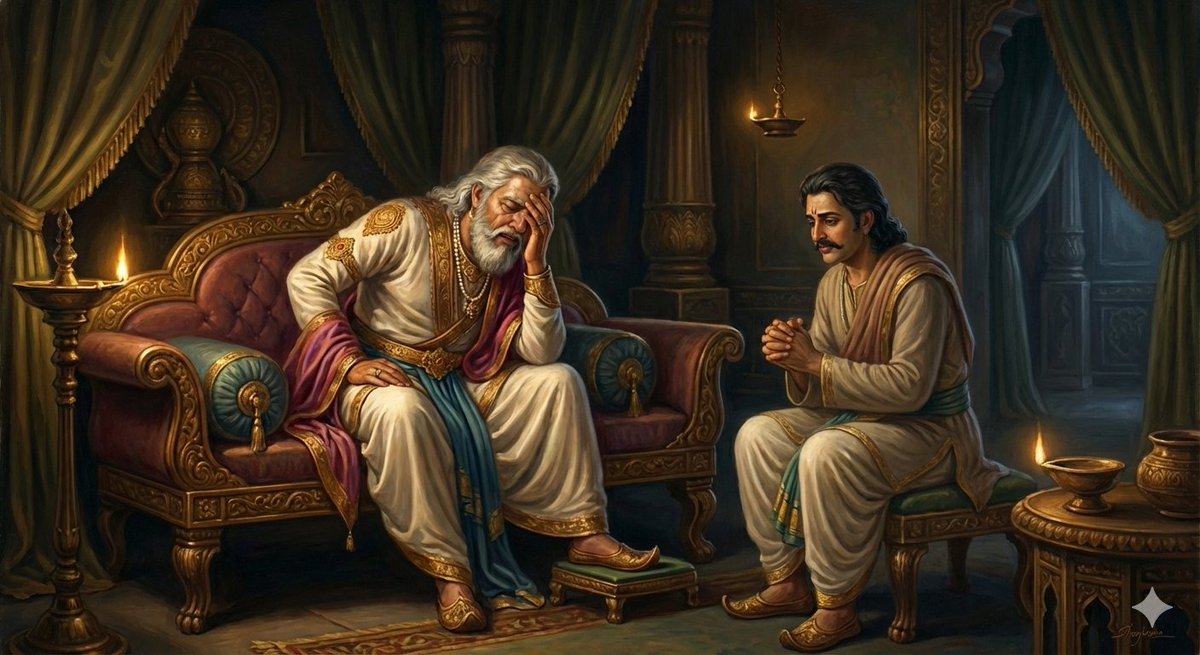
 After Drona’s death, the Kaurava princes and their army were struck with shock and grief, standing pale, silent, and almost senseless, with weapons dropping from their hands. Seeing their despair, Duryodhana rallied them, declaring that death is the natural fate of warriors and urging them to fight on without despondency. He praised Karna and Ashvatthama as invincible heroes, boasting of Karna’s past feats and urging the Kauravas to unite and display their combined might against the Pandavas.
After Drona’s death, the Kaurava princes and their army were struck with shock and grief, standing pale, silent, and almost senseless, with weapons dropping from their hands. Seeing their despair, Duryodhana rallied them, declaring that death is the natural fate of warriors and urging them to fight on without despondency. He praised Karna and Ashvatthama as invincible heroes, boasting of Karna’s past feats and urging the Kauravas to unite and display their combined might against the Pandavas.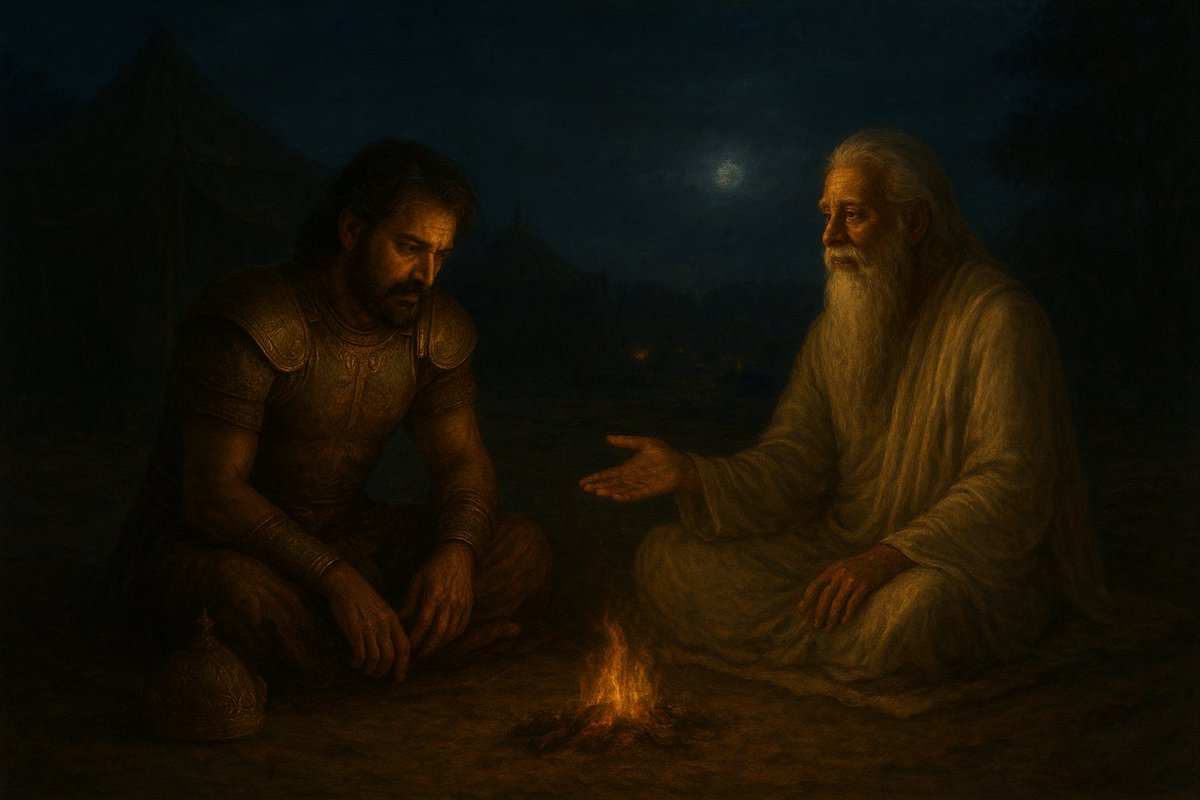
 Yudhishthira’s Grief Over Abhimanyu’s Death
Yudhishthira’s Grief Over Abhimanyu’s Death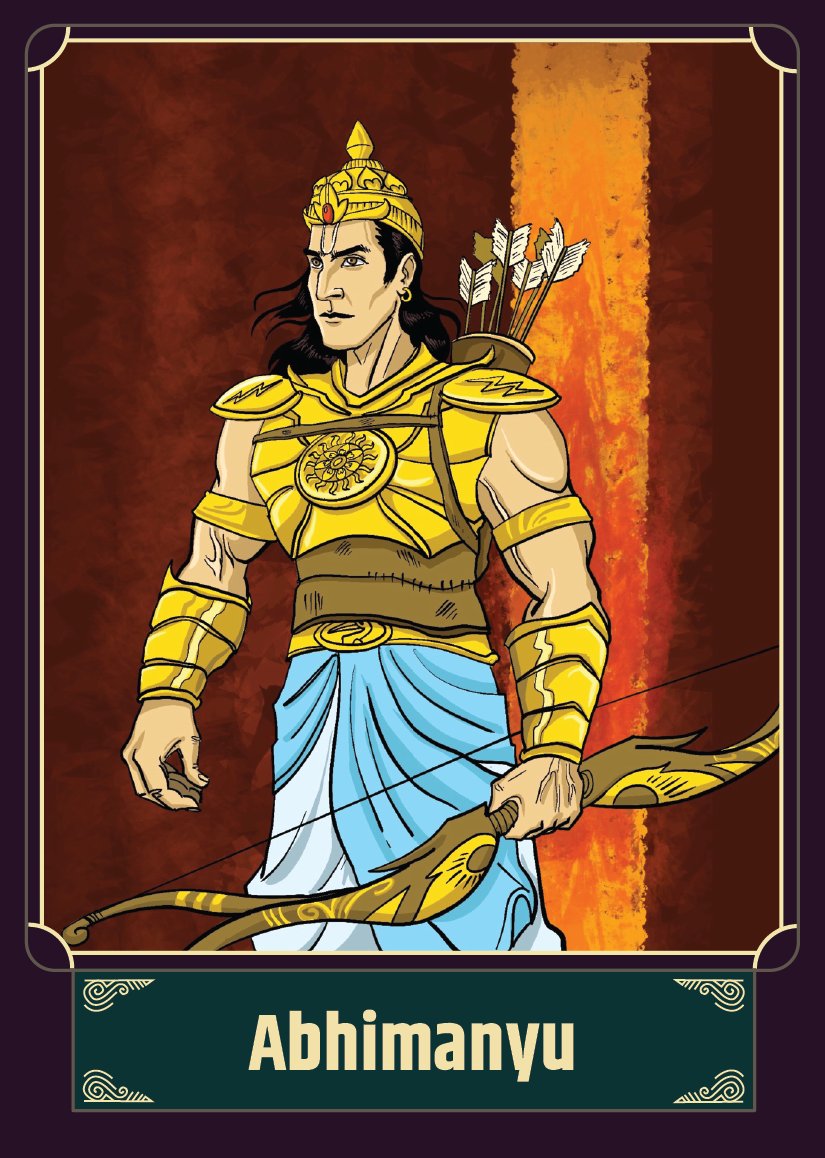
 Sanjaya first extolled the unmatched virtues, prowess, and character of the Pandavas and Krishna, then praised Abhimanyu as embodying all their combined qualities, equal in firmness to Yudhishthira, conduct to Krishna, valor to Bhima, beauty and skill to Arjuna, and humility to Nakula and Sahadeva.
Sanjaya first extolled the unmatched virtues, prowess, and character of the Pandavas and Krishna, then praised Abhimanyu as embodying all their combined qualities, equal in firmness to Yudhishthira, conduct to Krishna, valor to Bhima, beauty and skill to Arjuna, and humility to Nakula and Sahadeva.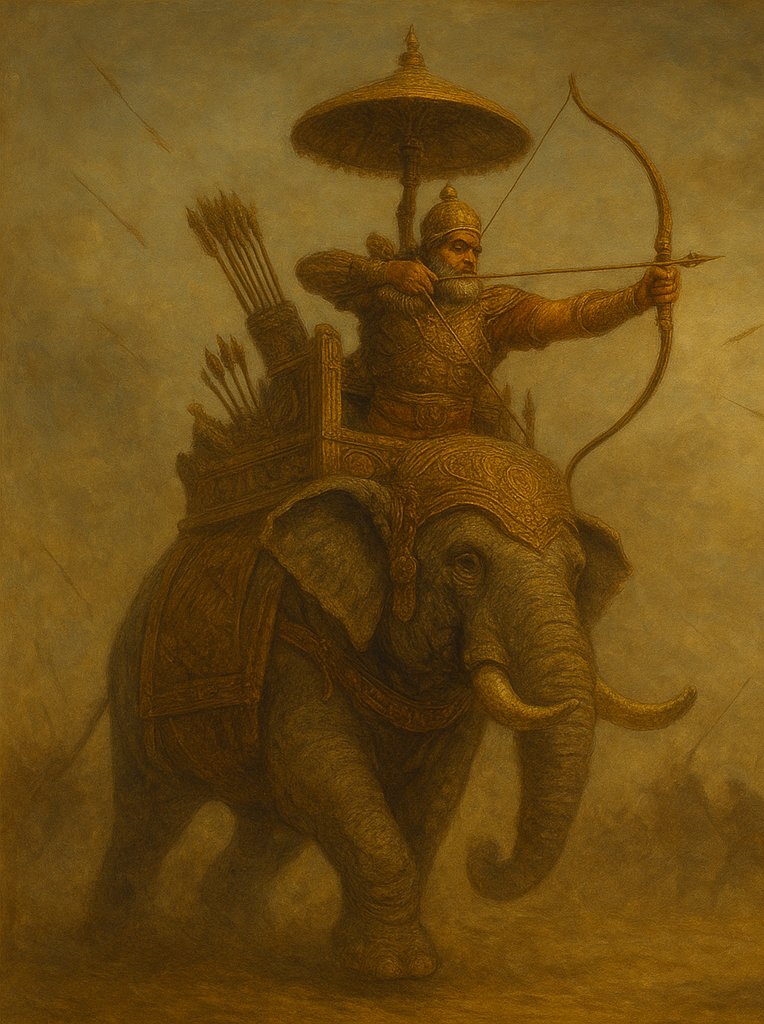
 The Samsaptaka Challenge
The Samsaptaka Challenge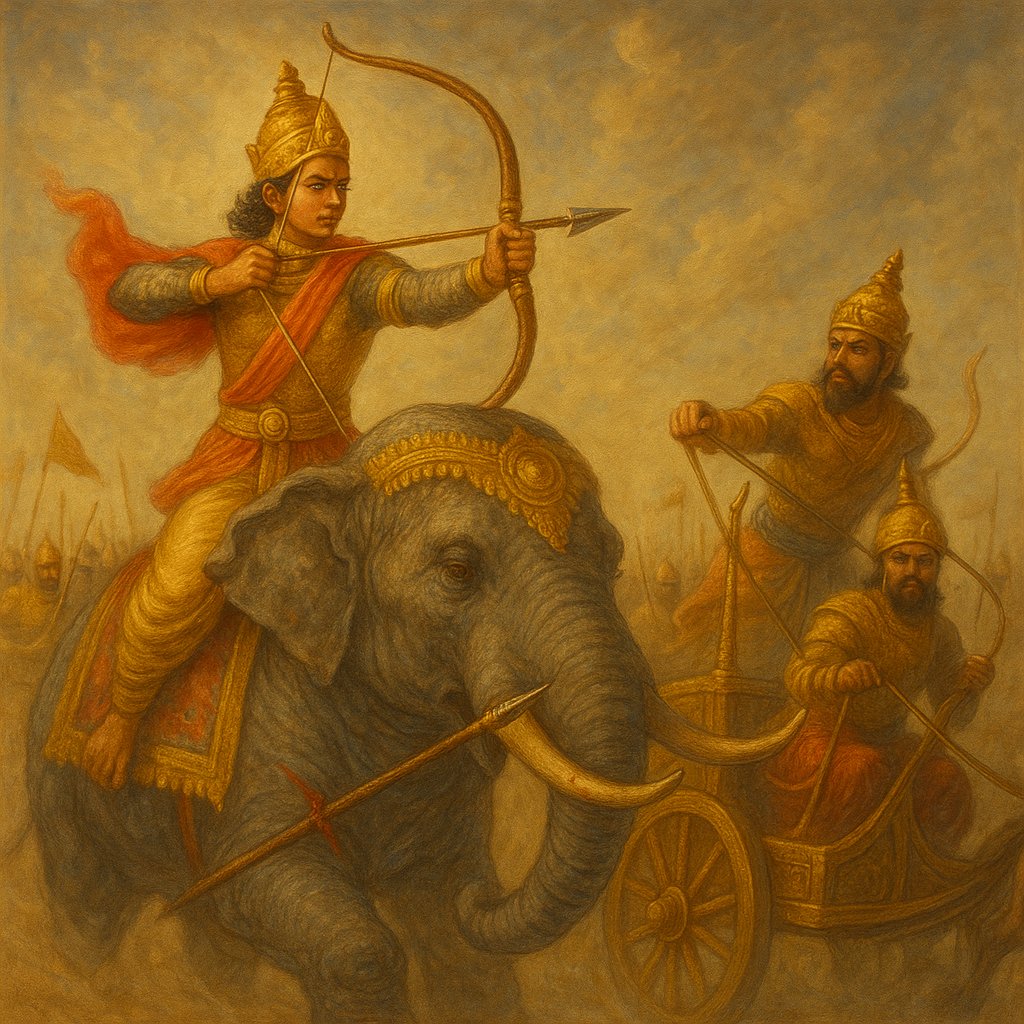
 As Yudhishthira walked through the Kaurava ranks, some warriors mocked him, thinking he was surrendering out of fear. However, he reached Bhishma, bowed at his feet, and requested his permission to engage in battle and his blessing. Bhishma, pleased, blessed him and offered a boon. Yudhishthira asked how Bhishma might be defeated, but Bhishma said he was invincible until the destined time of his death arrived.
As Yudhishthira walked through the Kaurava ranks, some warriors mocked him, thinking he was surrendering out of fear. However, he reached Bhishma, bowed at his feet, and requested his permission to engage in battle and his blessing. Bhishma, pleased, blessed him and offered a boon. Yudhishthira asked how Bhishma might be defeated, but Bhishma said he was invincible until the destined time of his death arrived.
 When Parashurama arrived near Hastinapura and summoned Bhishma, the grandsire respectfully visited him. Rama angrily questioned why Bhishma abducted Amba and then rejected her, rendering her unmarriageable. He commanded Bhishma to marry her and restore her honor.
When Parashurama arrived near Hastinapura and summoned Bhishma, the grandsire respectfully visited him. Rama angrily questioned why Bhishma abducted Amba and then rejected her, rendering her unmarriageable. He commanded Bhishma to marry her and restore her honor.
 सर्व दिव्य अस्त्र योक्तारम् यज्ञ विघ्न करम् सदा |
सर्व दिव्य अस्त्र योक्तारम् यज्ञ विघ्न करम् सदा |
 Bhishma began his classification:
Bhishma began his classification:
 He issues personal taunts to each Pandava:
He issues personal taunts to each Pandava:
 After Shrikrishna named Dhrishtadyumna as the supreme commander of the Pandava army, all the monarchs present erupted in joy, and a great shout of approval echoed across the camp. The Pandava forces began mobilizing with immense energy and excitement. The noise of conches, drums, war cries, the neighing of horses, and roars of elephants created a thunderous din, filling the air like a surging river in flood.
After Shrikrishna named Dhrishtadyumna as the supreme commander of the Pandava army, all the monarchs present erupted in joy, and a great shout of approval echoed across the camp. The Pandava forces began mobilizing with immense energy and excitement. The noise of conches, drums, war cries, the neighing of horses, and roars of elephants created a thunderous din, filling the air like a surging river in flood.
 Long ago, in a kingdom now forgotten, there lived a noblewoman named Vidula, renowned for her wisdom and fierce adherence to Kshatriya dharma. She was not gentle, nor did she seek to be. Her words were forged like steel—forged for truth, not for comfort.
Long ago, in a kingdom now forgotten, there lived a noblewoman named Vidula, renowned for her wisdom and fierce adherence to Kshatriya dharma. She was not gentle, nor did she seek to be. Her words were forged like steel—forged for truth, not for comfort.
 Following Shrikrishna's impassioned plea for peace, the great elders and counsellors of the Kuru court—Bhishma, Drona, Vidura, and finally King Dhritarashtra—all urged Duryodhana to abandon his destructive pride and reconcile with the Pandavas.
Following Shrikrishna's impassioned plea for peace, the great elders and counsellors of the Kuru court—Bhishma, Drona, Vidura, and finally King Dhritarashtra—all urged Duryodhana to abandon his destructive pride and reconcile with the Pandavas.
 Varunaloka
Varunaloka
 Bhagwan Parashurama recounted the story of King Dambhodbhava, a mighty and proud monarch who once ruled the entire earth. Arrogant and boastful, he routinely challenged all classes of people—Brahmanas, Kshatriyas, and others—asking if anyone could equal him in battle.
Bhagwan Parashurama recounted the story of King Dambhodbhava, a mighty and proud monarch who once ruled the entire earth. Arrogant and boastful, he routinely challenged all classes of people—Brahmanas, Kshatriyas, and others—asking if anyone could equal him in battle.
 Shrikrishna emphasized that peace was still possible and lay within Dhritarashtra’s power. If the king restrained his sons, Shrikrishna promised to ensure the Pandavas' cooperation as well. Uniting both sides, he said, would result in unmatched strength and prosperity. No enemy—earthly or celestial—could defeat such a union.
Shrikrishna emphasized that peace was still possible and lay within Dhritarashtra’s power. If the king restrained his sons, Shrikrishna promised to ensure the Pandavas' cooperation as well. Uniting both sides, he said, would result in unmatched strength and prosperity. No enemy—earthly or celestial—could defeat such a union.
 After rescuing the cows while Arjuna was looking for Duryodhana, a portion of Hastinapur army arrived in time for his aid. Arjuna instructed Uttara to forget about Duryodhana and look for Karna instead. Uttara swiftly moved the chariot towards Karna. Citrasena, Sangramajit, Satrusaha and Jaya, came in support of Karna. While Arjuna was countering their arrows, Vikarna approached them on his chariot. Arjuna broke Vikarna's bow and cut off his flagstaff making him flee from the battle.
After rescuing the cows while Arjuna was looking for Duryodhana, a portion of Hastinapur army arrived in time for his aid. Arjuna instructed Uttara to forget about Duryodhana and look for Karna instead. Uttara swiftly moved the chariot towards Karna. Citrasena, Sangramajit, Satrusaha and Jaya, came in support of Karna. While Arjuna was countering their arrows, Vikarna approached them on his chariot. Arjuna broke Vikarna's bow and cut off his flagstaff making him flee from the battle. 
 Next to enter was Bhima, dressed as a cook wearing black clothes. He entered the king's court and introduced himself. He told Virat that his name was Ballava and he was a cook, who was an expert in cooking various dishes. He added that he used to cook for King Yudhishthira in the past and was looking for work. Bhima also told the king that he was an skilled wrestler.
Next to enter was Bhima, dressed as a cook wearing black clothes. He entered the king's court and introduced himself. He told Virat that his name was Ballava and he was a cook, who was an expert in cooking various dishes. He added that he used to cook for King Yudhishthira in the past and was looking for work. Bhima also told the king that he was an skilled wrestler. 

 The Sage of Kurukshetra
The Sage of Kurukshetra
 One day Bhagwan Mahadeva disguised as a Kirat (hunter), accompanied by devi Uma, appeared near Arjuna. Around the same time a demon named Mooka, in the form of a boar was ready to charge at Arjuna. Arjuna saw the boar, who was ready to attack him and picked up his bow. As soon as Arjuna drew his bow, the hunter called him out asking him to stop, since he had already aimed at the boar. Arjuna ignored the hunter and the boar was simultaneous struck by two arrows. The boar struck by those arrows regained his original form of a rakshasa and died.
One day Bhagwan Mahadeva disguised as a Kirat (hunter), accompanied by devi Uma, appeared near Arjuna. Around the same time a demon named Mooka, in the form of a boar was ready to charge at Arjuna. Arjuna saw the boar, who was ready to attack him and picked up his bow. As soon as Arjuna drew his bow, the hunter called him out asking him to stop, since he had already aimed at the boar. Arjuna ignored the hunter and the boar was simultaneous struck by two arrows. The boar struck by those arrows regained his original form of a rakshasa and died.

 Draupadi started with reminding Yudhishthira about the glory days at Indraprastha when he used to sit on a throne made of ivory which was studded with many precious gems. She reminded him of days when he used to be surrounded by kings who were eager to please him. She talked about the lavish food cooked by various chefs they used to enjoy and compared that with the life they were forced to live because of Duryodhana.
Draupadi started with reminding Yudhishthira about the glory days at Indraprastha when he used to sit on a throne made of ivory which was studded with many precious gems. She reminded him of days when he used to be surrounded by kings who were eager to please him. She talked about the lavish food cooked by various chefs they used to enjoy and compared that with the life they were forced to live because of Duryodhana.